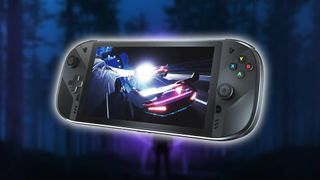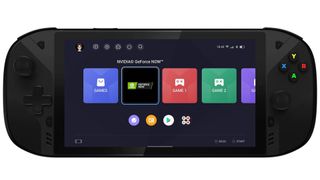Lenovo is cooking up a handheld gaming PC, and I’m hoping it’s the cheapest Steam Deck competitor yet
Holding for a low priced Lenovo handheld hero

The handheld gaming PC scene is blossoming into something beautiful, and Lenovo is reportedly set to join in. We don’t know much about the Windows 11 portable as of yet, other than the fact it’ll use an AMD APU, so it’s hard to tell what the company’s battleplan is. However, there’s a chance it’ll become a true Steam Deck competitor that challenges Valve’s 64GB model on price, and I think that’s exactly what the fledgling market needs right now.
Lenovo’s rumoured gaming handheld will face stiff competition if it actually arrives, as both the Steam Deck and Asus ROG Ally aren’t the only options out there. Our Ayaneo 2S review takes a look at the premium side of the market, and there are various other companies occupying the price space above Valve’s portable and its Asus rival. There’s a significant lack of anything going on entry-level wise, and it could be a great opportunity for Lenovo to grab an unclaimed realm of players.
According to an exclusive report by Windows Central, the handheld in question is dubbed the Lenovo Go, and it’ll allegedly sport an AMD Phoenix APU and an 8-inch screen. Again, we’ve no idea what else the portable will provide inside or out, but it’s safe to assume it’ll bark up the exact same tree as Valve and Asus. The main question is, will Lenevo go all out and create a premium machine, or will we see a new entry-level champion enter the fold? I’m holding out for it being the latter.

At the moment, there are no $399 Steam Deck alternatives, as even the Asus ROG Ally targets players eyeing up the 512GB model. If Lenovo strikes a good balance between specs and performance, it could provide budget buyer’s with a reason to opt for the Go over the cheapest handheld PC available. That’d give the laptop company a chance to work its way up the chain towards Asus and the likes of Ayaneo, rather than chaining itself to higher end expectations.
While we'll need to wait and see whether Lenovo actually takes up the mantle of cheaptest Steam Deck rival, its activity when it comes to tablets suggests it might. Both the Tab P11 and M10 are examples of devices that maintain a competitive position within the lower ranks of tablet pricing, so the company has a history of occupying entry level spaces.
Of course, one of the main reasons to pick up a Steam Deck over a Windows handheld is SteamOS, as while Linux comes with compatibility quirks, Valve’s platform is more console-like. That said, Windows Central says Microsoft is planning to support brands with its handheld PC ventures, and the tech giant might already be helping Lenovo create an improved portable Windows 11 experience.
If that is the case, and Lenovo also manages to create a device that costs around $400, I think it’d be enough to set the handheld scene ablaze. At the moment, premium portables are a bit of a hard sell, as you can pick up a Switch for a fraction of the price.
Sign up to the GamesRadar+ Newsletter
Weekly digests, tales from the communities you love, and more
Yet, if a handheld PC that costs the same as a console and can run every PC game via an intuitive interface arrives, we may end up with something that’d even sway people waiting for the Nintendo Switch 2, That’s perhaps a bit of a pipe dream, but I’d love to see what kind of competition break out within the entry-level segment soon. Let's just hope the Lenovo Go doesn't end up failing to launch like the Lenovo Legion Play.
Looking for a conventional portable PC? Check out our best gaming laptop picks for a selection of on the go rigs. Alternatively, take a peek at the best Alienware gaming PCs for high spec desktop machines.

I’ve been messing around with PCs, video game consoles, and tech since before I could speak. Don’t get me wrong, I kickstarted my relationship with technology by jamming a Hot Wheels double-decker bus into my parent’s VCR, but we all have to start somewhere. I even somehow managed to become a walking, talking buyer’s guide at my teenage supermarket job, which helped me accept my career fate. So, rather than try to realise my musician dreams, or see out my University degree, I started running my own retro pop culture site and writing about video games and tech for the likes of TechRadar, The Daily Star, and the BBC before eventually ending up with a job covering graphics card shenanigans at PCGamesN. Now, I’m your friendly neighbourhood Hardware Editor at GamesRadar, and it’s my job to make sure you can kick butt in all your favourite games using the best gaming hardware, whether you’re a sucker for handhelds like the Steam Deck and Nintendo Switch or a hardcore gaming PC enthusiast.
Most Popular




